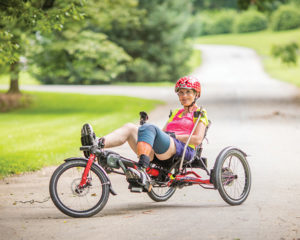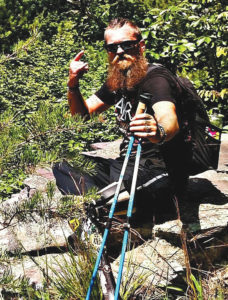By Eric Quander
“IF ONLY I HAD A, I COULD BE B.” “I CAN’T DO X, BECAUSE I DON’T HAVE Y.”
Exchange the variables for whatever nouns are apropos, but the result is the same—not living your best life because you believe you don’t have what you need. You’ve fallen into believing in “the lack.” Like anyone else, amputees can get caught in the trap of preventing their own happiness by allowing their focus to settle on what is missing, rather than on the possibilities.
You can’t avoid the facts. The fact is that one or more of your limbs are gone and will not be growing back. You are in a survival situation. You hear the horror stories of those who, due to a wound’s inability to heal, multiple surgeries, or financial challenges, may find themselves bedridden, enduring an extensive stay in a rehabilitation facility, or requiring a wheelchair for months or even years. If you’re lucky, you get through your surgery and rehab, are fitted for a prosthesis, and are given a few cheerful words before being sent on your way to hobble along to some unknown destination that resembles a normal life. Where can this place be found? Well, not to get all mystical, but far wiser men than me conclude that it is within.
You’re not sent on your way totally empty-handed; you’re given markers in the forms of support groups, internet forums, and social media blogs about living an #AMPSTRONG life. Along the road, you’ll come across all sorts of people, from those who fetishize amputees to amputees on a quest for the opportunity to explore challenges and opportunities that push their physical and artistic limits. Every community has its stories, and most amputee stories are stories of survival. Two such examples are Elizabeth Kase of Maryland and Chris Cavanaugh of Kentucky.
Amputees are usually willing to share their tales without too much prompting. A stillness happens when such stories are shared. You may find yourself holding your breath in anticipation, waiting for when the disease, accident, war story, or just plain bad luck comes barreling around Deadman’s Curve at 100 mph, crashing and slicing through skin, flesh, and bone to claim appendages that destiny says are hers. You never know where on the path of healing and happiness the people you meet are, just that you’ve all crashed headfirst into a barricade on the road of life at some time or another. For whatever personal reasons that make you want to at least try, even when you feel you have little left in the reserve tank, you figure out, as my grandmother would say, “God ain’t through with you yet,” and you go about dragging, hopping, or rolling along, trying to put things together again.

Elizabeth Kase is a wild woman by nature. No, not the kind that hangs around honky-tonks and dances on tabletops silhouetted in a Pabst-hued neon glow; Kase is the kind of woman who is most at home among rolling bike trails or in the deep sea. She received the gift of gifts around her 50th birthday when due to infections she became a quad amputee. A caregiver by nature, Kase’s resurrection was of the divine. “After hearing the Lord [while I was] in a coma, I feel I’ve been given my life back,” she says.
Awakening from her coma, surrounded by a loving but distraught family, Kase returned to her skills in caring for others to regain her footing in life. “I immediately went into ‘nurse mode,’ consoling my family and telling them everything would be all right,” she says. Leaders do this in survival situations: place their own pain on the side of the road and find strength in helping others. When the situation looks grim, leaders ignore what isn’t—the lack—and focus on what is. For Kase, that meant coming to terms with her body and challenging herself on how she could make it stronger.
About four years after her amputation, she decided to challenge herself by traversing the Appalachian Trail by bicycle. “I figured I may not be able to walk it, but I could certainly ride it,” she says. She completed 600 miles before excruciating pain set in, and she had to retire from the ride. Undaunted, Kase got involved with two organizations committed to helping amputees reclaim their lives: the IM ABLE Foundation (www.imablefoundation.org) and the Adaptive Diving Association (www.adaptivedivingassociation.org). Connecting with organizations helped increase Kase’s network, providing her with appropriate training equipment and, most importantly, a support team to help her reach her goals. She continued training at the gym and discovered various adaptive sports, including CrossFit training and scuba diving. Now, she and a partner are training for the IM ABLE Duathlon and 5K (www.imablefoundation.org/im-able-duathlon-and-5k), where Kase will do the bike portion of the competition. She also plans to take photos during an adaptive dive in Roatan later this year. “I never looked at what I didn’t have; I just stayed focused on what I could do,” she says.
I like the way this woman of the woods tells her story, and I picked up a piece of sage advice from Kase’s philosophy on her life’s purpose: “The best thing I can do is to share how life goes on,” she says. “I have pain, but who doesn’t. We all have something we’re coping with; this just happens to be my something.” Indeed, we all do have something.

Chris Cavanaugh’s “something” is his aspiration to inspire others. Cavanaugh reminds me of the boys from back home in Virginia: quiet and cool. He and his family live pretty much off-grid in the hills of Daniel Boone National Forest in Kentucky. His wisdom is not the kind that hits you straight off. Naw, it’s the kind that sneaks up on you, real subtle like, and when it hits you, boy, it’ll be a wallop! He got his first wallop in a car accident that made him a left above-knee amputee at the age of 38. Recently married, he sat on the edge of his hospital bed, unsure if a woman would want what remained. In the first of many dark hours, inspiration came via the invisible waves of the internet. Warriors find strength in one another, and Cavanaugh found motivation in the story of Derek Weida, a former paratrooper of the 82nd Airborne Division in the United States Army. In 2007, Weida was shot through the right knee during a house raid in Iraq. Discharged and with no place to put his energy, Weida decided to push himself physically, and has since become a well-known competitive athlete in the world of adaptive sports. Likewise, Cavanaugh, having been an active outdoorsman pre-amputation, set a goal to push his physical limits.
“I decided to do something insane and hike the Rough Trail in Red River Gorge,” he says. With miles of extremely rough terrain, uneven and steep paths, and hillsides and paths veined by rambling creeks, the Kentucky trail has been known to take the lives of more than a few. What hope could an amputee have of making it? Despite the protestations of friends and family, Cavanaugh set out to do what he had been told could not be done.
They were right; he didn’t complete the journey. Deep into his trek, beleaguered by an irritated and swollen residual limb, cramps in his good leg, and meandering through a fog of dizziness, fever, and cold sweats, Cavanaugh had to literally be pulled off the trail by those with his best interest at heart. What some might call failure doesn’t bother Cavanaugh. I asked him, “With one leg and heat stroke, what made you want to go on?” That’s when Cavanaugh, who I imagine standing tall, dappled in sunlight piercing the branches of a majestic beech, says at just the right tempo, “Stubbornness, yup, I guess plain ole stubbornness propelled me.” That push has Cavanaugh planning the next time he will attempt the challenge. Until then, he says, “I just want to inspire people to live the life they want.” We should all aim so high.
Lack is a delusion. Don’t get me wrong; your limb or limbs are gone, and you will have to figure out how to live a fulfilling life, starting now. Many spiritual paths teach that suffering is the result of craving. The very concept of craving implies falling short of fulfillment, or rather existing in a paradigm of there never being enough—a place of lack. You may develop a deep understanding of the hows and whys (on both the medical and spiritual planes) of being an amputee, but even when you get to those answers, you’ll still be an amputee.
Philosopher Wayne Dyer encourages us to remember, “I am a human being, not a human doing.” Equating our self-worth with how well we do things in relation to others is a fool’s errand. The only goals we need to exceed are those that we set for ourselves. You deserve more than putting off your dreams, aspirations, and goals for a better day that may never come. I recently heard podcast personality Zo Williams say, “Love is the reward of conquering self.” Amen, brother! Focusing on “the lack” is a diversion from happiness and an act contrary to loving self. Like all things, lack is a temporary state of being. Love yourself through the delusion. Embracing “the lack” with faith, courage, and wisdom will catapult us to places we might never have imagined.



